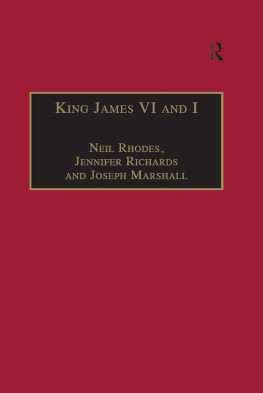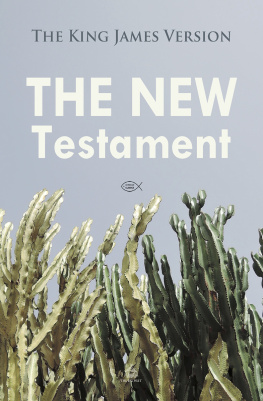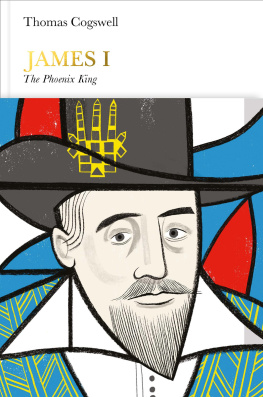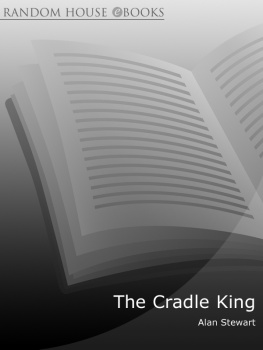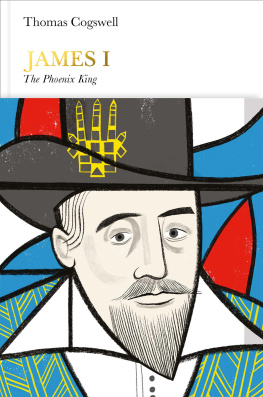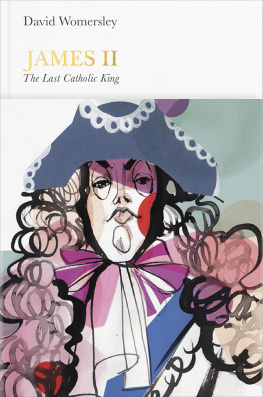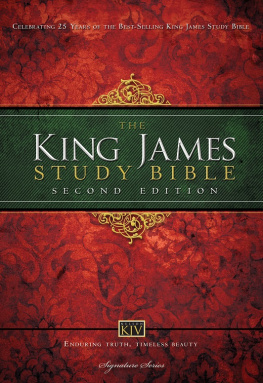King James VI and I
King James VI and I
Selected Writings
Edited by
Neil Rhodes, University of St Andrews, UK
Jennifer Richards, University of Newcastle upon Tyne, UK
Joseph Marshall, National Library of Scotland, UK
First published 2003 by Ashgate Publishing
Published 2016 by Routledge
2 Park Square, Milton Park, Abingdon, Oxon OX14 4RN
711 Third Avenue, New York, NY 10017, USA
Routledge is an imprint of the Taylor & Francis Group, an informa business
Copyright Neil Rhodes, Jennifer Richards and Joseph Marshall 2003
Neil Rhodes, Jennifer Richards and Joseph Marshall have asserted their moral right under the Copyright, Designs and Patents Act, 1988, to be identified as the editors of this work.
All rights reserved. No part of this book may be reprinted or reproduced or utilised in any form or by any electronic, mechanical, or other means, now known or hereafter invented, including photocopying and recording, or in any information storage or retrieval system, without permission in writing from the publishers.
Notice:
Product or corporate names may be trademarks or registered trademarks, and are used only for identification and explanation without intent to infringe.
British Library Cataloguing in Publication Data
James, I, King of England
King James VI and I: selected writings
I. Title II. Rhodes, Neil III. Richards, Jennifer IV. Marshall, Joseph
828.4'09
Library of Congress Cataloging-in-Publication Data
James I, King of England, 1566-1625. [Selections. 2003]
King James VI and I : selected writings / edited by Neil Rhodes, Jennifer Richards, and Joseph Marshall.
p. cm.
Includes bibliographical references and index.
ISBN 0-7546-0482-9 (alk. paper)
1. Great Britain-History-James I, 1603-1625-Sources. 2. ScotlandHistoryJames VI, 1567-1625-Sources. I. Title: Selected writings. II. Rhodes, Neil, 1953-III. Richards, Jennifer. IV. Marshall, Joseph. V. Title.
DA391 .J36 2003
941.06T092dc21
2002074541
ISBN 13: 978-0-7546-0482-2 (hbk)
Contents
Neil Rhodes acted as general editor for this volume as well as being responsible for Dmonologie, Basilicon Doron, The Trew Law of Free Monarchies and A Counterblaste to Tobacco. He is Professor of English Literature and Cultural History at the University of St Andrews, and the author of The Power of Eloquence and English Renaissance Literature (Harvester, 1992) and co-editor, with Jonathan Sawday, of The Renaissance Computer: Knowledge Technology in the First Age of Print (Routledge, 2000). His other publications include English Renaissance Prose: History, Language and Politics (MRTS, 1997), John Donne: Selected Prose (Penguin, 1987) and Elizabethan Grotesque (1980). He is currently completing a book entitled Shakespeare and the Origins of English, to be published by Oxford University Press.
Jennifer Richards, who took responsibility for the poetry in this volume, is Senior Lecturer in English at the University of Newcastle. She is the author of articles on Castiglione in Criticism and Renaissance Quarterly, co-editor with James Knowles of Shakespeares Late Plays: New Readings (Edinburgh University Press, 1999) and editor of Elizabeth Rowes Poems on Several Occasions 1696. She has also completed a monograph, Rhetoric and Courtliness in Early Modern Literature (Cambridge University Press, 2003).
Joseph Marshall received his PhD from the University of Edinburgh in 2000. He is a Curator at the National Library of Scotland. For this volume, he was responsible for Jamess Speaches to Parliament, The Book of Sports, A Meditation on Matthew and Directions for Preachers.
The aim of the present edition is to bring together in a single volume Jamess more significant works in order to demonstrate the diversity of his interests and achievements as a writer. The only previous such collection is the Workes of 1616/17 which omits the poetry altogether. Here, then, James is presented both as a poet and a political writer for the first time, as well as in a number of other literary roles. To do this, without resorting to extracts, we have had to make economies elsewhere, and it was decided at an early stage not to include the letters, since anything like a representative selection from Jamess enormous correspondence would have been at the expense of several other important texts. The letters can be read in the edition by G.P.V. Akrigg cited in the Bibliography. With this exception, the texts presented here offer a full reflection of the range of Jamess literary output.
Each individual text is given complete, though we have not included everything from the collections of poetry. There has been a modest amount of editorial intervention, most obviously in the modernisation of i/j and u/v. Contractions have been expanded, occasionally some typographical errors have been silently corrected, but otherwise minor emendations (for example, to a lower case character following a full stop) have been placed within square brackets. Nor have we attempted to reproduce every typographical feature of the original texts. We have not always followed the layout of the titles of individual works, which are sometimes rather lavish with space, and we have regularised some minor features such as italicised first letters in the poems and capitalised first words elsewhere. Some works, of course, present more textual complications than others, and this is reflected in the annotation to Daemonologie and Basilicon Doron. For a detailed discussion of the texts of Jamess works, the reader should consult the editions by James Craigie listed in the Bibliography.
James wrote in both Scots and English. Scots words and obsolete or archaic English words and forms, indicated by an asterisk in the text, are listed in the Glossary, but this does not include a separate category of Scotticisms. Other terms requiring explanation have been glossed at the foot of the page, along with proper names. Since the aim of this edition is to represent Jamess writings as fully as possible, annotation of this kind has been light, but (in contrast to Craigie) we have provided translations where James uses Latin, Greek or French, and we have also made occasional reference to other contemporary literary texts in order to suggest the cultural context to which he belongs. The collection of critical essays on James, Royal Subjects: Essays on the Writings of James VI and I, edited by Daniel Fischlin and Mark Fortier, appeared too late for us to use extensively in this edition, but we have been able to refer to it at points in our Introduction, and we hope that the two books will complement each other in developing a greater understanding of James as a writer.
Acknowledgements
For permission to reproduce material for illustrations the editors would like to thank Glasgow University Library, Department of Special Collections, The Master and Fellows of Magdalene College, Cambridge, The Trustees of the National Library of Scotland and the Public Record Office; and, for financial support, the School of English at the University of St Andrews. Neil Rhodes is grateful to Alex Davis and Andrew Murphy for advice on the introduction, to Rachel Heard for help in preparing the texts for which he was responsible and for checking the Folger manuscript of Daemonologie

